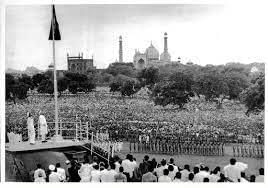Test: India After Independence - UPSC MCQ
10 Questions MCQ Test - Test: India After Independence
Name the occasion/event where thousands of Indians gathered on 15 August 1947 based on the image given below:


Who was the first Prime Minister of independent India who hoisted the Indian flag on 15 August 1947?
Which one of the following words/terms refer to The Right to Vote
A series of meetings of the Constituent Assembly were held in New Delhi after Indian's independence with different political parties for an important discussion. What was the outcome of these series of meetings ?
Some important features of the Indian Constitution are given below: Pick if any, statement not TRUE.
Pick out the date on which the new Indian Constitution came into force.
Based on the image given below who is the important leader who introduced the resolution that outlined the objectives of the Indian Constitution?
From the following options, alongwith the Untouchables, who were granted reservation in seats and jobs as per the Constitution of India ?
Identify this personality based on the clues given :
He was respectfully referred to as Babasaheb
He belonged to a Marathi speaking Dalit family and a revered leader of the Dalits.
He was a lawyer and economist
One important features of the Constitution was its adoption of universal adult franchise. Which of the following statements best describe this term.



















